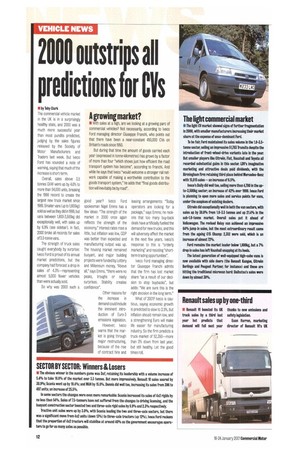2000 outstrips all predictions for Us
Page 14

If you've noticed an error in this article please click here to report it so we can fix it.
• by Toby Clark
The commercial vehicle market in the UK is in a surprisingly healthy state, and 2000 was a much more successful year than most pundits predicted, judging by the sales figures released by the Society of Motor Manufacturers and Traders last week. But Iveco Ford has sounded a note of warning, saying that much of the increase is short-term.
Overall, sales above 3.5 tonnes GVW were up by 4.6% to more than 54,000 units, breaking the 1998 record to create the largest new truck market since 1989. Smaller vans (up to1,8004) sold as well as they did in 1999, but vans between 1,800-3,500kg did exceptionally well, with sales up by 6.9% (see sidebar). In fact, 2000 broke all records for sales of 3.5-tonne vans.
The strength of truck sales caught everybody by surprise: Iveco Ford is proud of its annual market predictions, but the company had forecast a drop in sales of 4.3%—representing almost 5,000 fewer vehicles than were actually sold.
So why was 2000 such a good year? Iveco Ford spokesman Nigel Emms has a few ideas: "The strength of the market in 2000 once again reflects the strength of the economy." Interest rates rose a little, but inflation was low, GDP was better than expected and manufacturing output was up. The housing market remained buoyant, and major building projects were funded by Lottery and Millennium money. "Above all," says Emms, "there were no peaks, troughs or nasty surprises. Stability creates confidence".
Other reasons for the increase in demand could include the imminent introduction of Euro-3 emissions legislation.
However, Iveco warns that the market is going through major restructuring, because of the rise of contract hire and leasing arrangements: "Today operators are looking for a package," says Emms; he reckons that too many buy-back deals have artificially fuelled the demand for new trucks, and this will adversely affect the market in the next few years. Iveco's response to this is "orderly marketing" and resisting "shortterm trading opportunities".
Iveco Ford managing director Giuseppe Franchi admits that the firm has lost market share "as a result of our decision to stop buybacks", but adds: "We are sure this is the right decision in the long term."
What of 2001? Iveco is cautious, saying economic growth is predicted to slow to 2.5%, but inflation should remain low, and a strengthening Euro will make life easier for manufacturing industry. So the firm predicts a truck market of 52,350—more than 3% down from last year, but still healthy. Let the good times roll.
































































































